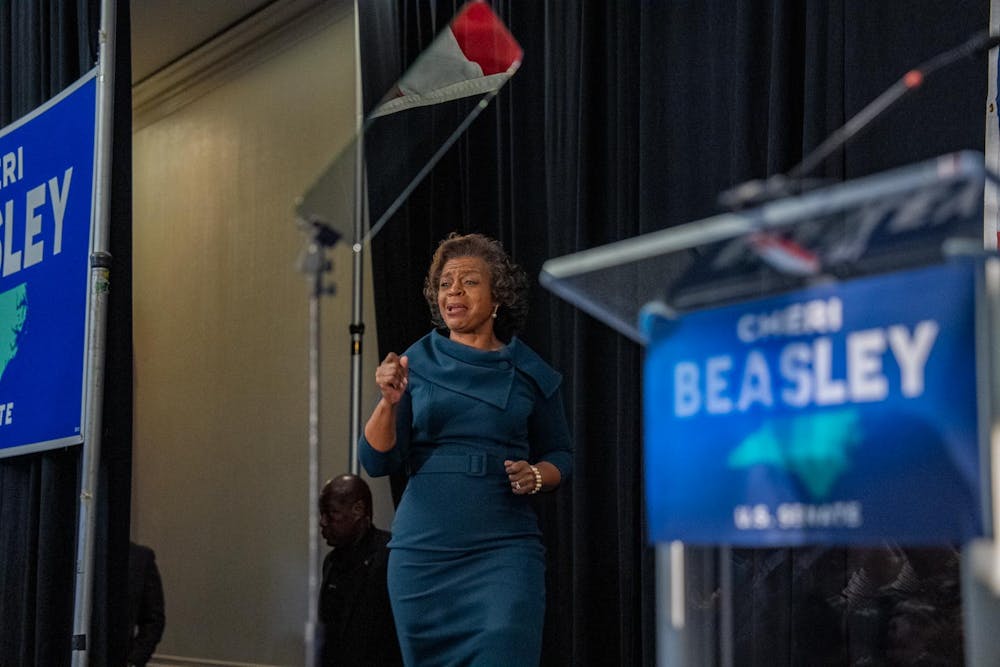The Hon. Cheri Beasley has joined the Elon University School of Law faculty as the university’s first recipient of the Justice Sandra Day O’Connor endowed professorship.
Beasley, who in 2019 became the first African-American woman to serve as chief justice on the North Carolina Supreme Court, will teach courses on appellate practice at Elon Law for one year beginning in fall 2024.
Elon Law Dean Zak Kramer said he is especially excited about the new addition to the faculty, calling Beasley’s appointment a “win for our community.”
“She is a trailblazer and an important member of the North Carolina legal community,” Kramer said. “Someone with Chief Justice Beasley’s varied experience is going to give students a perspective of what it's like to be a practicing lawyer, what it's like to be a judge and how to live the highest standards of being an ethical, rigorous attorney.”
The Justice Sandra Day O’Connor professorship was established to bring distinguished legal figures to Elon University, whose contributions to society reflect the values of the first woman who served on the Supreme Court of the United States. A year after O’Connor’s retirement, she spoke at Elon Law’s first convocation when the school first opened its doors in 2006. O’Connor died on Dec. 1, 2023.
“Representing and understanding the contributions that Justice Sandra Day O'Connor made to this country, and to Elon, is a true honor,” Beasley said. “I think her model bodes very well for students of the law school about why it's so important that lawyers have such a crucial role in our state and in our country.”
Beasley will be delivering public lectures over the next year, contributing to professional development opportunities for both students and other faculty members.
“To provide the opportunity to study under law professors who have had good professional experiences inside and outside the classroom is really golden for the students,” Beasley said. “I hope that students are very excited about law school at this time. This is an incredible time to be entering the profession.”
Beasley started her judicial career in 1999 as a North Carolina District judge. In 2008, she served as an associate judge on the North Carolina Court of Appeals before being appointed to the Supreme Court of North Carolina four years later.
North Carolina Gov. Roy Cooper appointed her in 2019 to serve as chief justice of the stateSupreme Court after the resignation of Chief Justice Mark Martin, making Beasley the fourth African-American woman in U.S. history to serve as chief justice in any state’s highest court.
Beasley emphasized the importance of honoring O’Connor’s contributions to not only the rule of law, but to the country — as well as her involvement and belief in the university to cultivate leaders.
“I remember studying her work when I was a law student,” Beasley said. “She took her obligation to the rule of law and administrative justice very seriously.”
Beasley’s appointment is especially meaningful to Kramer, who came to Elon from Arizona State’s law school — also known as the Sandra Day O'Connor College of Law. Kramer said he was able to interact with O’Connor several times through his work at Arizona State.
“Chief Justice Beasley is an incredible woman and an incredible attorney, as was Justice O'Connor,” Kramer said. “It gives me hope that people will use the appointment of Chief Justice Beasley as the O’Connor professor to learn a little bit about Justice O’Connor.”
Beasley is a graduate of both the University of Tennessee College of Law and Douglas College of Rutgers University, having also earned a Master of Laws in Judicial Studies from Duke University.
Beasley is also the recipient of many awards and honors, including the North Carolina Association of Women Attorneys’ Gwyneth B. Davis Award, the University of Tennessee Knoxville Trailblazer Award and inductions into The Douglass Society and the Rutgers University African-American Alumni Alliance Hall of Fame.
“I'm excited about being a part of the opportunities that Elon Law has to offer, seeing the growth and challenges that law students will present to us,” Beasley said. “They will be the next generation of lawyers to move our profession forward.”


